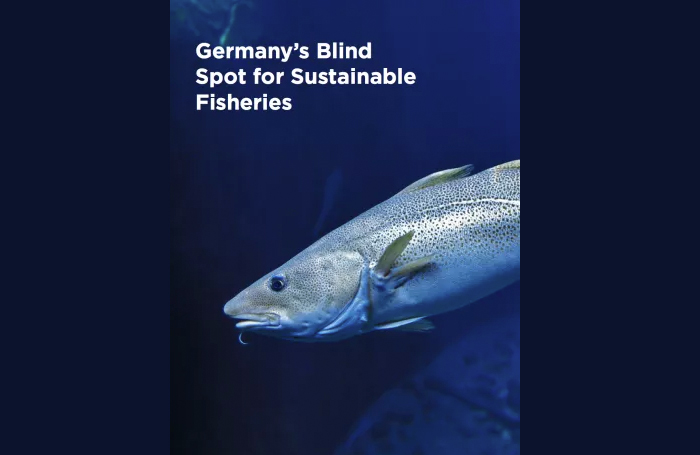Bonn, 28 August 2017: Despite its reputation as Europe’s moral leader on environmental issues, Germany’s continues overfishing in the Baltic Sea, thus delaying potentially large environmental, social, and economic benefits for its coastal communities that would come from regaining healthy fish stocks, according to a report published today.
The report, Germany’s blind-spot for sustainable fisheries, co-authored by Our Fish and the New Economics Foundation, outlines how the incoming German Government can end overfishing and get in step with European fisheries law by setting fishing quotas according to scientific advice, and by helping small-scale low-impact fishers with a fairer quota allocation system. Federal elections are due to take place on September 24th.
“The German government has repeatedly supported overfishing of western Baltic cod, leading the public to believe that this is because of ‘socio-economics’. However the figures tell a different story – not only would following scientific advice for fishing quotas bring higher economic returns sooner, but the current allocation of quotas benefits destructive trawlers that have the biggest environmental impact and the smallest contribution to jobs”, said Our Fish Program Director Rebecca Hubbard.
 “Of Germany’s two main fishing fleets who share western Baltic cod, the small-scale low-impact sector has access to just 35% of the quota and employs 747 people, whereas the heavily damaging trawl sector has 59%, but employs one fifth the number of people.” (1)
“Of Germany’s two main fishing fleets who share western Baltic cod, the small-scale low-impact sector has access to just 35% of the quota and employs 747 people, whereas the heavily damaging trawl sector has 59%, but employs one fifth the number of people.” (1)
“By setting fishing limits at sustainable levels and changing the quota allocation system to prioritise small-scale low-impact fishers, the new German government can better ensure the economic viability and ecological sustainability of coastal communities.”
Western Baltic Cod stocks have spent years teetering on the edge of collapse, yet Germany has consistently set fishing limits above scientific advice (2,3). German officials will be meeting with representatives from all EU Baltic states at BALTFISH in Copenhagen this week to discuss their position on Baltic fishing quotas for 2018. Advice from the trawl industry-dominated Baltic Sea Advisory Council is pushing for western Baltic cod fishing quotas to be more than 3,000 tonnes above the upper end of scientific advice (4).
“The incoming German government needs to address this blind spot for sustainable fisheries by applying proper scrutiny to its national fisheries management. Germany needs urgent reform of how it allocates fisheries quotas if it is to comply with the spirit of the EU Common Fisheries Policy and play a leading role in ending overfishing of Europe’s waters”, concluded Hubbard.
The report, Germany’s blind-spot for sustainable fisheries can be downloaded from http://bit.ly/DEFishBaltic0817
END
NOTES:
- New Economics Foundation & Our Fish (2017), Germany’s blind post for sustainable fisheries.
- Western Baltic cod has been overfished for a number of years, so that even after a strong 2016 year class, stocks are still at the second lowest biomass levels since the early 1980s, and outside of safe limits for repopulating to a healthy state. ICES (2017), ICES Advice on fishing opportunities, catch, and effort, Baltic Sea Ecoregion. Published 31 May 2017. Cod.27.22-24
- New Economics Foundation (2017), Landing the Blame – Overfishing in the Baltic 2017.
- BSAC recommendations for the fishery 2018, retrieved from http://bsac.dk/BSAC-Resources/BSAC-Statements-and-recommendations/BSAC-recommendations-for-the-fishery-2018
Contacts
Dave Walsh, Communications Advisor, dave@our.fish +34 691826764
Rebecca Hubbard, Program Director, rebecca@our.fish +34 657669425
About Our Fish
Our Fish works to ensure European member states implement the Common Fisheries Policy and achieve sustainable fish stocks in European waters.
Our Fish works with organisations and individuals across Europe to deliver a powerful and unwavering message: overfishing must be stopped, and solutions put in place that ensure Europe’s waters are fished sustainably. Our Fish demands that the Common Fisheries Policy be properly enforced, and Europe’s fisheries effectively governed.
Our Fish calls on all EU Member States to set annual fishing limits at sustainable limits based on scientific advice, and to ensure that their fishing fleets prove that they are fishing sustainably, through monitoring and full documentation of their catch.

